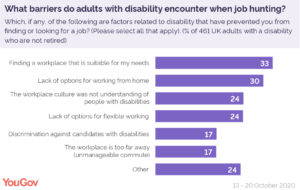Lingua-Disabled Discrimination
What is the lingua-disable bias? Is it a problem for people with disabilities? Is it widespread and unavoidable? Let’s examine the issue in more detail. Disabled people are frequently subjected to language that is insensitive or outright derogatory. Let’s look at some of the most common examples. Using the r-word as an example, it is common for people with disabilities to feel that they don’t measure up to “normal” peers.
One way to fight this language is to include disability discrimination studies in general education. This will increase people’s awareness of ableism. People who use the word ‘r-word’ have no personal connection to those with disabilities and won’t stop to think about it. Education is the key to preventing exclusionary language. It can take place in a formal setting like a classroom or in an informal one such as a dinner table.
disability harassment at workplace
The ADA Amendments Act prohibits discrimination based on a disability, although some state laws have different standards than the ADA. For this reason, it is important to check the laws in your state and consult an attorney if necessary. It is also advisable to check whether a company is required to implement the ADA when hiring. If it does, be sure to tell the company that you are aware of the law.

What is Lingua-Disabled Discrimination?
The ADA allows employers to refuse hiring someone with a disability, but only if the person has the ability to perform essential job functions with reasonable accommodations. It is also unlawful to discriminate based on association or relationship. The ADA also prohibits discrimination based on unfounded assumptions or bias. However, employers may be required to provide sign language interpreters to job applicants with disabilities.
While the ADA prohibits employers from discriminating against employees, the definition of “disability” is still unclear. Its definition of “disability” includes mental or physical limitations. However, it also covers those who are perceived as disabled or who have a disability history. Employees with disabilities are entitled to reasonable accommodations. However, this right is not unlimited. The employer must be willing to take on an interactive process with the employee to provide reasonable accommodations.
Whether an employer refuses to accommodate a disabled employee’s disability requires more than just an accommodation, the ADA protects job applicants against discrimination. While an employer can ask a candidate about their abilities regarding essential job functions, it is illegal to subject them to medical tests before they are offered a position. In addition, some employers may also conduct medical tests after they offer a position to an applicant.